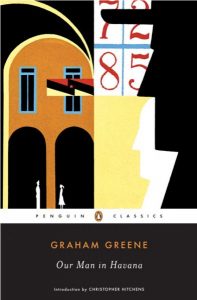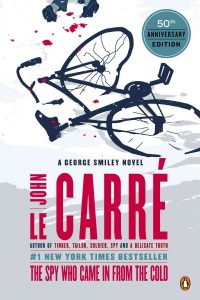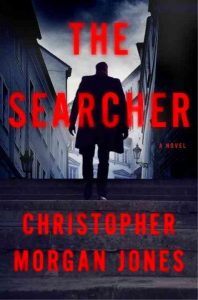Harlot’s Ghost by Norman Mailer
 This wonderful book ends with the three most anticlimactic words in literature—to be continued—but those are the only ones that disappoint. It tells the story of Harry Hubbard, son of a spy, whose own career in the CIA charts the heady Cold War days when the agency seemed to hold the world’s fate in its hands, in Berlin, Cuba, and then Moscow. Mailer throws everything in: ambition, greed, betrayal, deception, multiple seductions, and a lot of sex, most of it extravagant in one way or another. More reviewers hated it than loved it, but as a spy novel (or half of one), it’s completely successful, with sequences of action and sustained suspense that would look at home in the best straight genre work, and along the way, it tries to do something that few other novels about the period would ever go near: to understand the differences between the Russian and the American soul that gave rise to the Cold War in the first place.
This wonderful book ends with the three most anticlimactic words in literature—to be continued—but those are the only ones that disappoint. It tells the story of Harry Hubbard, son of a spy, whose own career in the CIA charts the heady Cold War days when the agency seemed to hold the world’s fate in its hands, in Berlin, Cuba, and then Moscow. Mailer throws everything in: ambition, greed, betrayal, deception, multiple seductions, and a lot of sex, most of it extravagant in one way or another. More reviewers hated it than loved it, but as a spy novel (or half of one), it’s completely successful, with sequences of action and sustained suspense that would look at home in the best straight genre work, and along the way, it tries to do something that few other novels about the period would ever go near: to understand the differences between the Russian and the American soul that gave rise to the Cold War in the first place.
The Second Confession by Rex Stout
 Edgar Hoover thought that Rex Stout was a Communist or, at best, an agent of the Communists and had the FBI watch him from the 1930s on. Probably there was nothing to see. Stout seems to have liked real Communists about as much as he liked Nazis, against whom he campaigned throughout the war. In this 1949 novel, Stout’s overweight genius hero, the private detective Nero Wolfe, is asked by a client to demonstrate that the man who’s taking a tilt at his daughter is a Communist. He isn’t, but in the process Wolfe discovers that he is a member of America’s most dangerous criminal organization, run by America’s most dangerous criminal and Wolfe’s nemesis, Arnold Zeck. Apart from being as much fun as any detective novel ever written, The Second Confession is interesting in light of Stout’s own politics and about US perceptions of the Communist threat in the very early days of the Cold War. Six months after it was published, those perceptions would crystallize into fear when Senator McCarthy gave his famous speech claiming that the State Department was “infested” with Reds.
Edgar Hoover thought that Rex Stout was a Communist or, at best, an agent of the Communists and had the FBI watch him from the 1930s on. Probably there was nothing to see. Stout seems to have liked real Communists about as much as he liked Nazis, against whom he campaigned throughout the war. In this 1949 novel, Stout’s overweight genius hero, the private detective Nero Wolfe, is asked by a client to demonstrate that the man who’s taking a tilt at his daughter is a Communist. He isn’t, but in the process Wolfe discovers that he is a member of America’s most dangerous criminal organization, run by America’s most dangerous criminal and Wolfe’s nemesis, Arnold Zeck. Apart from being as much fun as any detective novel ever written, The Second Confession is interesting in light of Stout’s own politics and about US perceptions of the Communist threat in the very early days of the Cold War. Six months after it was published, those perceptions would crystallize into fear when Senator McCarthy gave his famous speech claiming that the State Department was “infested” with Reds.
Gorky Park by Martin Cruz Smith
 Gorky Park doesn’t so much explore the Cold War as use it to create the backdrop and scenario for a perfect spy thriller. John le Carré and others had imagined Russia through the eyes of the intelligence officers who studied it. Cruz Smith, on the other hand, sets the action in Moscow and gives us as his hero a homicide detective, Arkady Renko, who suffers from an inability to ignore the truth—an affliction, it turns out, in the USSR of the 1970s. One of the many brilliant things about the book, which is as good a page-turner as you’ll read, is that Renko the policeman is forced to navigate the world of the espionage novel—of obscure allegiances, ruthless game-playing, and the highest possible geopolitical stakes. He’s a human being in a world constructed by politicians and spies, and we feel his vulnerability in every step.
Gorky Park doesn’t so much explore the Cold War as use it to create the backdrop and scenario for a perfect spy thriller. John le Carré and others had imagined Russia through the eyes of the intelligence officers who studied it. Cruz Smith, on the other hand, sets the action in Moscow and gives us as his hero a homicide detective, Arkady Renko, who suffers from an inability to ignore the truth—an affliction, it turns out, in the USSR of the 1970s. One of the many brilliant things about the book, which is as good a page-turner as you’ll read, is that Renko the policeman is forced to navigate the world of the espionage novel—of obscure allegiances, ruthless game-playing, and the highest possible geopolitical stakes. He’s a human being in a world constructed by politicians and spies, and we feel his vulnerability in every step.
Our Man in Havana by Graham Greene
 Not many books play the Cold War for comedy. Graham Greene was one of the few writers to notice that
Not many books play the Cold War for comedy. Graham Greene was one of the few writers to notice that
in the deadly seriousness of the contest, in its absurd thirst for the smallest scrap of intelligence, and in the humorlessness and fallibility of those who played it, it was rich in comic possibility. With the lightest of edits, Our Man in Havana could easily be a straight spy story, but instead Greene skews everything just enough to create something surprisingly and joyfully close to farce. Wormold, an English vacuum salesman in Cuba, is recruited as an agent by the British Secret Service, and because he has no access to useful intelligence of any kind, invents a network of agents who do. And proceeds to take their salaries. So good is the product of his imaginary spy ring that London decides to send him a secretary, forcing Wormold into a series of inspired and precarious improvisations. At least one dachshund is poisoned in the process.
 The Spy Who Came In From the Cold by John le Carré
The Spy Who Came In From the Cold by John le Carré
An obvious choice but who could leave it out? The first chapter, which sees the hero, Alec Leumas, waiting at a Berlin checkpoint for his prize agent to cross to the safety of the West, is simply perfect, working at a pitch of tension that most novels don’t ever reach. The rest has the confidence and poise to meet and answer that opening challenge (where do we go from here?). This was le Carré’s third novel and the first by anyone to really distill the icy logic of the Cold War, to capture its chilling, limiting effect on the human beings caught in its machinery. It was another eleven years until the Smiley trilogy, but this was the book that began to change the way we all viewed and understood not only the spy novel, but the Cold War itself.
 BIO: For eleven years Chris Morgan Jones worked at the world’s largest business intelligence agency. He has advised Middle Eastern governments, Russian oligarchs, New York banks, London hedge funds and African mining companies. The Searcher is his latest novel.
BIO: For eleven years Chris Morgan Jones worked at the world’s largest business intelligence agency. He has advised Middle Eastern governments, Russian oligarchs, New York banks, London hedge funds and African mining companies. The Searcher is his latest novel.
